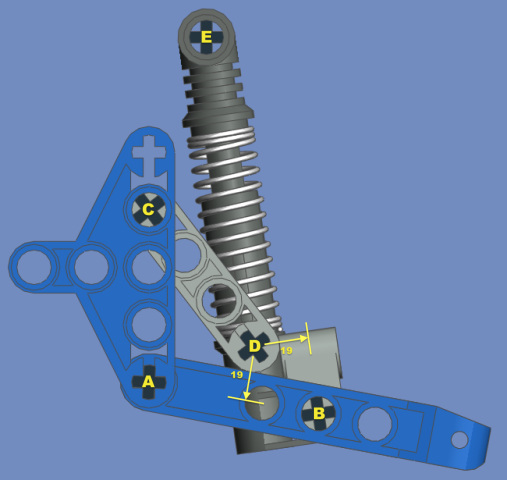I haven't posted one of these for a little while (because I've learned so much already from previous ones), but here's my latest Technic math puzzle, from the 8880 Supercar:
Consider the suspension assembly pictured. The blue control arm rotates around A, and the length of AB is 60. The gray liftarm rotates around C, and of course CD is also 60 (as is AC, for that matter). The radius around D is 9.
The shock absorber is connected at B and E. Also at B, there is a gray stopper piece, and this is locked together with the shock absorber to the axle at B.
The purpose of the stopper is to wedge the liftarm between it and the control arm. When this happens, point D would be 19 LDU (its radius of 9 plus half the width of the adjacent parts) along both the Y-axis of the control arm and the Z-axis of the stopper. This means that the control arm can't be raised any more, so there must be a minimum possible value for the angle at A. That's what I want to find.

Right now I don't have enough values to solve the problem, because there are multiple possible solutions where D is 19 from both vectors. But eventually the length of the liftarm stops the assembly from closing any further, and I haven't worked out how to express this mathematically. I've got it "close enough" for now, with an approximate angle at A of 100.5°. But as always, I'm keen to know the precise answer, and the method to obtain it!
Consider the suspension assembly pictured. The blue control arm rotates around A, and the length of AB is 60. The gray liftarm rotates around C, and of course CD is also 60 (as is AC, for that matter). The radius around D is 9.
The shock absorber is connected at B and E. Also at B, there is a gray stopper piece, and this is locked together with the shock absorber to the axle at B.
The purpose of the stopper is to wedge the liftarm between it and the control arm. When this happens, point D would be 19 LDU (its radius of 9 plus half the width of the adjacent parts) along both the Y-axis of the control arm and the Z-axis of the stopper. This means that the control arm can't be raised any more, so there must be a minimum possible value for the angle at A. That's what I want to find.
Right now I don't have enough values to solve the problem, because there are multiple possible solutions where D is 19 from both vectors. But eventually the length of the liftarm stops the assembly from closing any further, and I haven't worked out how to express this mathematically. I've got it "close enough" for now, with an approximate angle at A of 100.5°. But as always, I'm keen to know the precise answer, and the method to obtain it!









